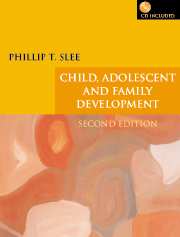Book contents
- Frontmatter
- Contents
- List of Trends and issues
- List of Family life-cycles
- List of Figures and Tables
- Note to the Student
- Note to the Instructor
- How to use the CD-ROM
- Acknowledgements
- Introduction
- Part 1 The Study of Human Development
- 1 Seeing Children in Context
- 2 Concepts of Development
- 3 Theoretical Foundations of Child Development
- Part 2 Conception and Birth
- Part 3 Infancy
- Part 4 Toddlerhood
- Part 5 The Pre-school Years
- Part 6 Middle Childhood
- Part 7 Adolescence
- Part 8 Studying Human Development
- Glossary
- References
- Index
- STUDENT FEEDBACK FORM
2 - Concepts of Development
from Part 1 - The Study of Human Development
- Frontmatter
- Contents
- List of Trends and issues
- List of Family life-cycles
- List of Figures and Tables
- Note to the Student
- Note to the Instructor
- How to use the CD-ROM
- Acknowledgements
- Introduction
- Part 1 The Study of Human Development
- 1 Seeing Children in Context
- 2 Concepts of Development
- 3 Theoretical Foundations of Child Development
- Part 2 Conception and Birth
- Part 3 Infancy
- Part 4 Toddlerhood
- Part 5 The Pre-school Years
- Part 6 Middle Childhood
- Part 7 Adolescence
- Part 8 Studying Human Development
- Glossary
- References
- Index
- STUDENT FEEDBACK FORM
Summary
‘I Never Ask Advice About Growing’
‘Seven years and six months!’ Humpty Dumpty repeated thoughtfully.
‘An uncomfortable sort of age. Now if you'd asked my advice, I'd have said “Leave off at seven” – but it's too late now.’
‘I never ask advice about growing,’ Alice said indignantly.
‘Too proud?’ the other inquired.
Alice felt even more indignant at this suggestion.
‘I mean,’ she said ‘that one can't help growing older’.
‘One can't perhaps,’ said Humpty Dumpty, ‘but two can. With proper assistance, you might have left off at seven’.
Lewis Carroll, Through the Looking GlassKEY TERMS AND CONCEPTS
Heredity versus environment
Continuity versus discontinuity
Similarity versus uniqueness
Stability versus instability
Activity versus passivity
Thinking versus feeling
Development
Maturation
Central tendency
Mean
Median
Mode
Normal distribution
Skewed distribution
Hypothesis
Correlation
Introduction
In this chapter consideration will be given to understanding the concept of ‘development’, reasons for studying child development, basic concepts underpinning such study, the conduct of research, and finally the reader will be introduced to some basic statistical terms. The nature of the family in Australia is the topic discussed in The Family Life-cycle: 2.
Child development concepts
Since the beginning of this century significant advances have been made in the study of children in terms of understanding the nature of development. Overton (1998) has identified that one feature of development about which there is general universal understanding is that development implies ‘change’. Rather simplistically, this notion has focused psychologists' attention on ‘changes in observed behavior across age’ (Overton 1998, p. 109).
- Type
- Chapter
- Information
- Child, Adolescent and Family Development , pp. 26 - 46Publisher: Cambridge University PressPrint publication year: 2002



